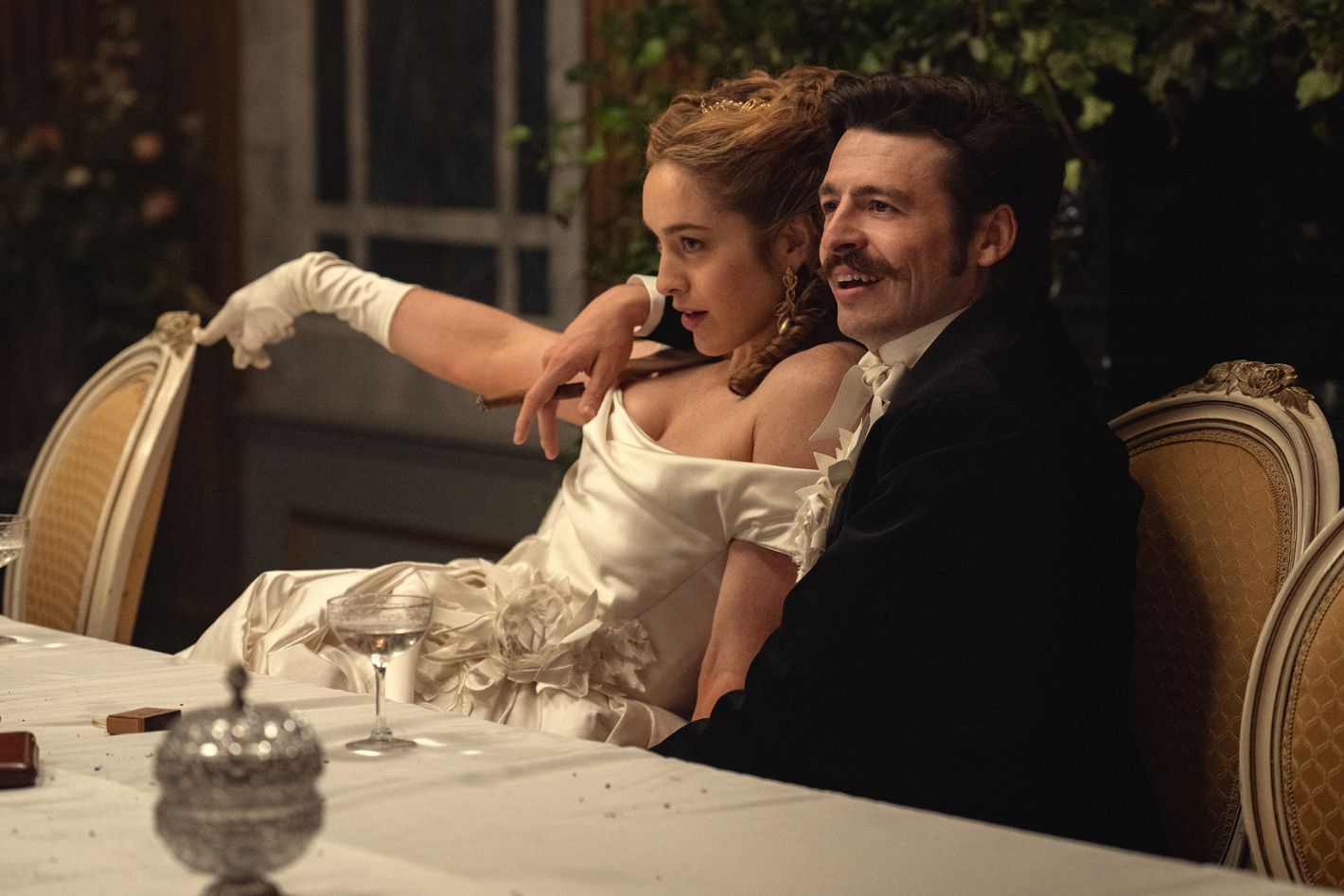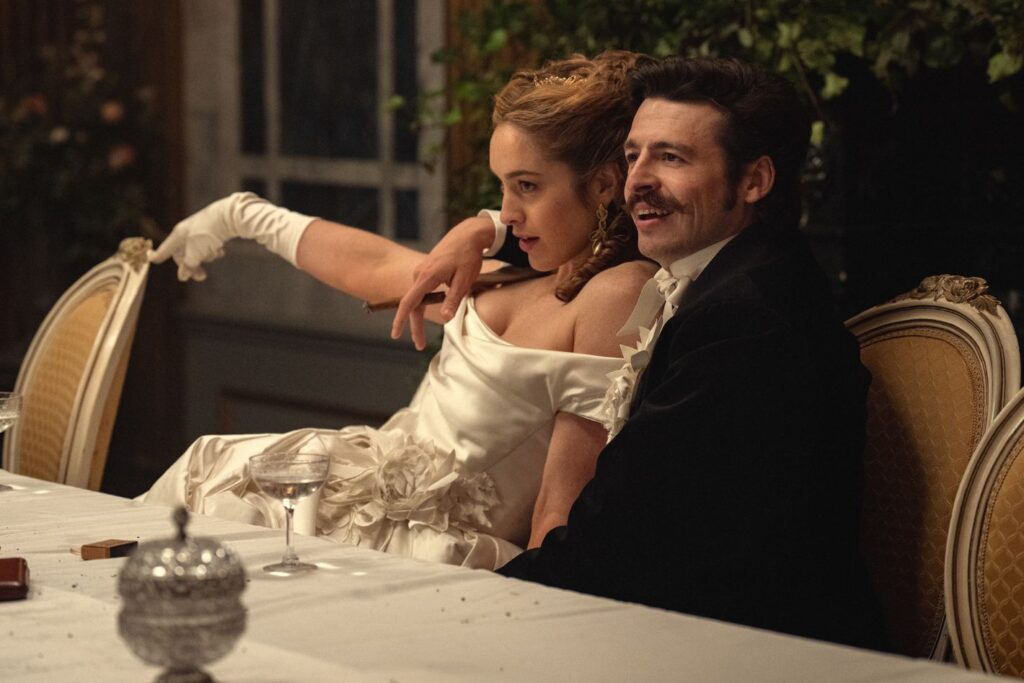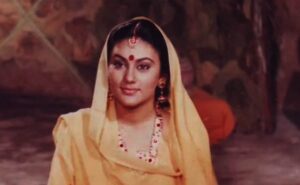
It’s the day of Arthur and Olivia’s wedding, a celebration of the happy couple’s new union. What could possibly go wrong? For starters, it might turn out that seemingly everyone in attendance is working some kind of agenda, whether subtly or out in the open for all to see. Anne and Aunt Agnes fall on the subtle end of the spectrum. As Arthur and Olivia have their first dance together as man and wife, they’re working through the list of potential brides for Edward, one from which they’ve already eliminated quite a few candidates. One, however, is conveniently nearby: Adelaide Guinness (Ann Skelly), a third cousin (and it’s worth remembering that Anne and Agnes’s project considers being a cousin a plus rather than a minus). But how to break the ice?
For some reason, that responsibility falls to Benjamin, who looks sharp in his new uniform. He’s also stayed sober (with some help from Potter), but that doesn’t mean his social skills have improved. Coached by Potter, Benjamin approaches Adelaide with the intent of making it easier for Edward to win her over. He’s timid. She’s not, practically running up to him as Christine looks on. Like Olivia, Adelaide favors direct talk and launches into a Pride and Prejudice–inspired conversation about whether he, as a wealthy man, is in want of a wife. Then, once it becomes clear that he’s not a wealthy man (which she clearly already knew), all cards are on the table: He’s there on Edward’s behalf. Olivia knows that Edward has a list of could-be brides. And she does not want to be on it. In fact, she’s not looking for a husband, and she doesn’t like the taste of Guinness. Ouch.
This sends Benjamin in Christine’s direction where he’s interrupted, once again, by an assertive woman who says what’s on her mind, to Christine’s distress. Her name, we’ll later learn, is Henrietta (Elizabeth Dulau), but when Aunt Agnes swoops in to see how the pair is getting along, she’s shocked to hear that Benjamin’s been talking about an English chambermaid with whom he’s apparently fallen in love in London. This, he quickly reveals, is just a ploy to exact what he really wants in an exchange for choosing a proper bride from the right circles: a generous allowance and a house in Chelsea. “You are indeed a Guinness,” his aunt replies.
While this drama unfolds, Arthur and Olivia look on, enjoying the festivities and each other’s company. That doesn’t mean that Olivia is blind to everybody else in the room, watching as Rafferty offers to accompany the ailing Anne home in a carriage. After Anne sends her husband, Reverend Plunket, away, she uses the opportunity to tell Rafferty about her recent miscarriage. Rafferty doesn’t offer much in the way of sympathy, describing their time together as both brief and now over before Plunket fetches his wife to bring her home himself. (Later in the episode, he’ll soften this position a bit.) But Rafferty’s night is not over. Called over by the drunken newlyweds, he finds himself on the receiving end of Olivia’s flirtation even while forced to bear witness to some unabashedly open-mouthed kissing between the bride and groom. Arthur’s having a great night up to the moment Rafferty mentions that the Fenians are behaving themselves.
It turns out that no one told Arthur that Ellen and Patrick Cochrane would be attending. This prompts Arthur to confront the siblings in the rudest possible way, even making some accusations of incest that drive Patrick into a rage. It takes Edward to defuse the situation, explaining that Ellen wants to move beyond the threat of blackmailing him and instead would like to work toward “a gradual movement without deadline toward a position of constructive engagement.” (Ellen and Edward are so aligned on this issue that they can even finish each other’s sentences.) It just makes practical sense, per their logic. Arthur remains enraged, but he also knows when he’s beaten.
Across the ocean, a wide-eyed Byron wanders the Bowery and, assuming that a fireman will know the lay of the land, asks directions from an unsmiling, top-hat-clad fellow on how to get to Eliza Street. This turns out to be a mistake after Byron confirms that he’s a fresh-off-the-boat Irish Catholic from Dublin. The firefighters — members of the notorious Bowery Boys gang, it turns out — give chase until a gun-toting group of Byron’s fellow expats comes to his rescue. Brought to his cousin William (Moe Dunford), a leader in the New York branch of the Fenian Brotherhood, Byron lays out his plan to popularize Guinness in America, where those who know it think of it as a kind of medicine for old people, if they know it at all. As for the Guinness family being protestants, Byron explains that they “walk a tightrope.” Whether or not Byron’s actions will make that tightrope harder or easier to work remains to be seen.
Political power is part of what allows them to walk that tightrope, and that looks likely to increase when Arthur is elected to Parliament. There’s an issue with that, however, which Anne brings to Edward’s attention during an unexpected late-night visit. It seems that Arthur’s team plans to rig the election in his favor by buying votes using a crude system involving used train tickets. Now it’s Edward’s turn to be enraged. He sets off to talk to Arthur, knowing just where to find him.
It seems that Arthur, confident that Bonnie has been paid for his silence and plans to remain silent, has resumed paying visits to Bonnie’s establishments and the private houses he uses for clients requiring extra layers of discretion. Arthur’s confused by his brother’s anger. He’s just doing what everyone else does, he’s been assured. Inside, Edward meets Arthur’s companion Arty (Rob Houchen), an old friend from Eton with whom Arthur (quietly) spends time when Arty visits Dublin. Convinced he has nothing to worry about, Arthur laughs it off, and even Edward can’t deny that Arthur seems happy, a shock so powerful he has to share it with his horse.
He’s onto something. Dining with Arthur and Olivia at their sunny home on Dublin Bay, he finds that the arrangement the newlyweds have struck seems to be working out pretty well. Arthur can go “play cards” as he likes. And, like Arthur, she’s not worried about the election. What’s more, Olivia has a theory about the two brothers. Arthur was born to rule. Edward was born to work. And that probably explains why Adelaide isn’t interested in him. It’s quite rude, prompting Edward to drop a reference to the train-tickets scheme as he leaves. Maybe this marriage’s bliss isn’t built to last after all.
Sláinte!
• Arty is revealed in the credits as Lord Arthur Clinton, an MP who became swept up in a scandal in 1870 when his lover, Ernest Boulton, and their friend, Frederick William Park, both actors who wore female attire in public, were arrested for “conspiring and inciting persons to commit an unnatural offense.” Clinton died after being subpoenaed to testify in their trial, which sent both to prison after inspiring a lot of lurid stories in the press. The official cause of death was scarlet fever, but this seems to be a cover for suicide. Now there’s a story begging for its own miniseries, and a reminder that the stakes are pretty high.
• Byron’s cousin, William, is William Randall Roberts, a leader of the Fenian Brotherhood who led raids on British territory in Canada, later serving as a representative from New York and as the U.S. ambassador to Chile. (That, too, feels like a story that needs a more thorough telling someday.)
• This episode’s soundtrack brings another track from Kneecap, “I bhFiacha Linne,” and “Jailbreak,” a classic from Thin Lizzy.
Everything is coming up Arthur. He’s getting married, rigging elections, “playing cards” — nothing can go wrong.

































































